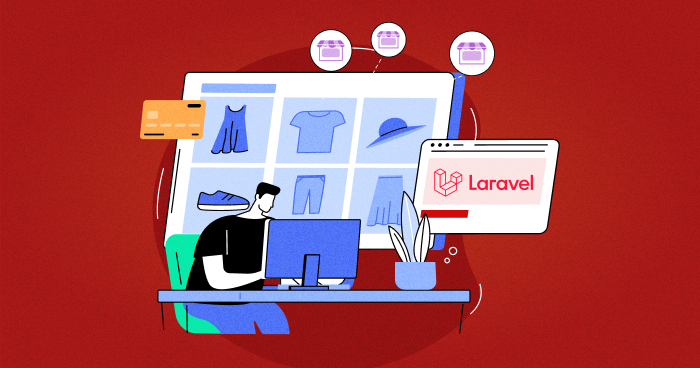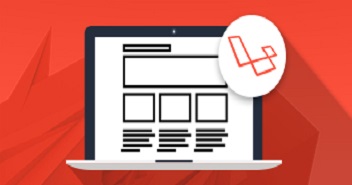
A content management system lets you create and oversee digital content by minimizing the development time and managing the site efficiently without any developer’s help. It enables you to customize your website’s content elements and develop a professional and easy-to-use ecommerce store.
A CMS suits uncomplex projects; however, developers prefer using a framework to handle complex projects as they can modify it accordingly. And among the leading PHP frameworks, Laravel is an excellent option for creating online stores, marketplaces, and other web apps, as it is free and open-source.
Laravel has a smooth learning curve, offers scalability, clean code structuring, and performance optimization for web applications, and has numerous built-in libraries and packages. Moreover, it protects online stores from malicious attacks via its optimized security mechanisms.
So you will need either a CMS or an open-source framework like Laravel to build an ecommerce store easily. But which one to choose among both options? Let’s find out which choice will suit your business better in this detailed blog as we compare the Laravel framework and ready-made CMS.
- Why Do So Many Ecommerce Businesses Use Ready-made CMS?
- Limitations of Traditional Shopping Cart Software Solutions
- Why Choose an Ecommerce Package for Laravel?
- Features Needed in an Ecommerce CMS
- Laravel Ecommerce Packages
- Tools That Optimize Laravel-Based Ecommerce Stores
- Performance Evaluation with Thunderstack
- Final Words
Why Do Most Ecommerce Businesses Use Ready-Made CMS?
It is commonly perceived that many leading businesses use CMS like WordPress and Drupal for their ecommerce applications. Ever wondered why do they pick CMS over Laravel? Let’s find out the reasons behind their decision.
Effortless Content Management
A CMS eases content management whether you own a complex AI-powered ecommerce platform or a simple online grocery store. Using its built-in functions like product additions, blog posts, SEO, and other tasks, a CMS lets you handle everything without requiring a developer’s help.
So, you can rely on a ready-made CMS to remove web management’s burdens and focus solely on your business.
Availability of plugins design themes
Popular PHP CMS like WordPress, Drupal, and Magento offer multiple free and paid plugins. They save time and ease various developmental tasks like UX customization, building and deploying contact forms, and invoice generation. That is why many developers and store owners prefer to use ready-made CMS to build optimized web applications.
Tailored approach to ecommerce problem solving
Ecommerce CMS platforms like WooCommerce or Magento address specific ecommerce needs and provide effortless store management mechanisms to the owners. They offer hassle-free development and top-notch web performance.
Security Features
Security is among the major concerns for an ecommerce store. As an online business owner, you want a highly secure website to safeguard customers’ confidential data and manage payments.
Laravel has both types of security in it – server security and application security. No framework can give you a 100% warranty for security but here Laravel has many secured features ensuring the security at the top.
Limitations of Traditional Shopping Cart Software Solutions
Monolithic architecture
With many advantages, a major setback of using pre-made ecommerce CMS is that it produces page-centric web apps. Also, the components used to develop a CMS require in-depth technical expertise to update. As a result, when your customer base grows and traffic starts surging, you are left in a no man’s land with failure-prone apps.
If you are developing an online store that aims to cater to a large audience, you should build your app on easily extendible and manageable platforms with custom solutions. Even choosing the best Laravel CMS packages like PyroCMS or OctoberCMS doesn’t guarantee customized scaling solutions using standard tools.
Restrictions imposed by CMS core & plugins.
Popular CMS platforms like WordPress, Drupal, Joomla and others were made to cater to specific needs like blogging, social networking, online brand management, etc. But if you require any extra functionalities like shopping cart, inventory management, delivery management or payment gateways, you will need 3rd party extensions to integrate those in your web applications. Hence these CMS restrict the acquiring of customized extra functionalities. In the end, you will require hundreds of plugins and extensions from different vendors to build your desired store.
Nothing as Easy as Deploying Laravel Apps on Cloud
With Cloudways, you can have your PHP apps up and running on managed cloud servers in just a few minutes.
Why Choose an Ecommerce Package for Laravel?
The PHP community has long debated the pros and cons of using Laravel or CMS platforms for app development. But the choice really comes down to individual preferences and organizational requirements.
Nevertheless, using Laravel over other CMS platforms does have several advantages especially when one wants to build an optimized ecommerce store. Some of these are:
High Scalability
As store owners regularly add up products, suppliers & related inventories to their online stores, they require scalable app solutions that serve a growing customer base, even if it’s thousands of customers. ecommerce CMS focuses on these advanced scalable solutions that you could customize at any level according to your desired requirements.
Independent Operation
CMS updates often cause unwanted overheads in web applications. But using an independent ecommerce site eliminates all these issues so you don’t have to worry about unnecessary updates that could slow down your website speed.
Flexibility in Laravel Shopping Cart Management
The ecommerce package for Laravel, which includes an effective shopping cart, greatly facilitates web store management. The primary code comes pre-set with the basic functionalities of carts, products, inventories, pricing, payment gateways and other services. You can also design your own workflows and thus manage your existing developmental tasks, as well as make room for future operations.
Omnichannel Support
Laravel provides omnichannel ecommerce experience, which highly optimizes the performance of your Laravel online shop. You can build an advanced omnichannel ecommerce network with Laravel ecommerce open source CMS by integrating all physical and digital stores.
Using ecommerce packages for Laravel, you can reduce your coding time and effort required for a basic online store, which boosts and streamlines your developmental jobs. Coding in Laravel is not easy; it requires technical expertise to develop an optimized ecommerce store. So the ecommerce packages for Laravel provide a pre-ready baseline for developers to build an advanced omnichannel ecommerce platform.
Features Needed in an Ecommerce CMS
A good ecommerce CMS should have the core features needed to grow your store; let’s find out more about those features.
Seamless Integration
No CMS is perfect, and you won’t get all features in one place with one CMS. However, if you require specific functionality that doesn’t come with the core CMS platform, you must ensure that the system integrates well with other tools and plugins.
Ideally, you’d need seamless integration with your existing tech stack and the flexibility to install and activate plugins when needed. The available extent of integrations will also determine the CMS’s popularity and API-friendliness.
SEO-Friendliness
On-page SEO for ecommerce sites almost knows the hacks, how, and where to put keywords. SEO is a way of communicating with google web crawlers and ensuring higher rankings in search results.
Each day Google is busy crawling millions of new and updated pages. So there is no surprise that URL brevity is empowered. If you remove unnecessary subfolders from your URLs, that’s ensured to boost the overall execution of your site.
Easy-to-Optimize for User Experience
As clients advance through their journey on your site, every interaction matters. You need to plan, edit and manage content throughout your store to make a custom-fitted, enjoyable user experience.
An easy-to-use CMS is especially significant for store owners with limited (or no) coding abilities. It enables you to quickly upgrade your store design and layouts to stay in competition with emerging industry patterns, special events and promo events.
Laravel Ecommerce Packages
Laravel provides many ecommerce packages that help developers create advanced web stores easily and flawlessly. The popular Laravel ecommerce packages are:
Bagisto

Bagisto is a free and open-source ecommerce platform that is built using the Laravel framework and vue.js. Accessibility is a priority, and it is designed for all levels of users to help them develop and scale their ecommerce businesses. It offers a great range of functionalities and lets you have complete control over the store.
Since it is powered by Laravel, it allows easy product management which enables the store owners to have freedom of product launch as per the market need and demand. Bagisto is convenient and flexible, even for a non-tech person. It reduces the time, cost, and resources required for setting up an online store or shifting from a physical store to a fully functional web store.
Aimeos

Aimeos tops the chart of popular ecommerce packages for Laravel in many ways. It not only provides basic features for building a fully functional Laravel shopping cart, but also has several other additional features such as multilingual support, customizable themes and SEO ready tools for better search engine rankings.
Aimeos package is absolutely free to use and gives blazing fast web speed when combined with an optimized server and efficient database system.
Mage2

Another popular ecommerce package for Laravel, Mage2 provides a set of modules for integrating various functionalities to an ecommerce store. Its usage in Laravel online shops is also quite different. Instead of just a singular installation, you can download different code snippets for different functionalities. Then those particular snippets are added to the core coding of the apps, so that the base code remains intact in its place.
The biggest advantage of using Mage2 is that it lets you pick and choose features according to your own preference. Moreover, it allows you to customize those code snippets according to the desired requirement of your ecommerce store.
Tools That Optimize Laravel-Based Ecommerce Stores
There are many tools available that help you optimize Laravel based online stores. I have listed few of them to give you insight into their cores, and how they optimize performance when integrated with a Laravel ecommerce store
PHP-FPM: PHP-FPM is one of the most commonly used tools for optimizing PHP apps’ speed. Developers can easily integrate it with Laravel-based apps to speed up the performance. Moreover, it comes pre-configured with the Cloudways custom Thunderstack.
Redis: Redis is a great tool to minimize cache loading time of the apps, and is also easy to integrate with Laravel-based apps. Cloudways provides pre-installed Redis on Thunderstack, and you can easily enable / disable it from the stack with just one click.
CDN: Content Delivery Network (CDN) is also a vital component for increasing web apps’ speed, as it provides fast data transmission to and from the relevant servers. Making the response time fast is what the basic purpose of CDN is, as reaching out to the wider audience requires speedy content delivery. On Cloudways, you can use its built-in CloudwaysCDN that helps you get the ultimate data transmission speed which your app needs.
Performance Evaluation with Thunderstack
Cloudways offers a dedicated custom stack of performance optimization resources on its platform that it calls the Thunderstack – these tools include Memcached, Varnish, Nginx, Redis and others. The ThunderStack boosts both applications’ run-time and debugs operations.
Varnish and Redis particularly make the app load time much faster. That is why Cloudways enables one-click operations of both these services on its platform.
Client Per Test
Client-side testing is known as the type of testing – also referred to as multivariate or commonly A/B testing – that occurs in the user’s browser. Usually contrasted with server-side testing, where the test cases are chosen on the server’s back end before they are served to the conclusion client.

Client Per Second
Client Per Second or Requests per second (RPS) is a metric that measures the throughput of a framework, which is typically the most imperative way to measure the system’s performance. Other parameters can be interesting (latency) depending on the application, but in a normal application, throughput is the main metric.

Maintain Client Load
Load testing is about making production simulations inside an application or framework as close as possible to being a finished product ready to deploy and subject to the masses. Using specialized testing software, load testing allows dev teams to answer questions like: Is the framework doing what it expects under these conditions?” and Is its performance good enough?

Final Words
The PHP community has long debated the pros and cons of using Laravel or CMS platforms for app development. But the choice comes down to individual preferences and organisational requirements.
I have demonstrated the performance benchmarks of a Laravel ecommerce application in this piece. But whether you decide to launch a new Laravel ecommerce platform or to update an existing one, it all depends on the preferences and required features for the project. Some prefer Laravel for certain features in the apps, while some disregard it because of imposed restrictions. Make sure to do your research before making a choice!
Q. Is Bagisto open source ?
A: Yes! Bagisto is an open-source ecommerce framework, and it will always be free under the MIT License Bagisto gives a wide range of extensions and plugins within the marketplace.
Q. Is Laravel good for ecommerce ?
A: Making online stores, marketplaces and other web apps related to ecommerce with Laravel has many advantages within itself. Laravel gives code structuring and optimized execution performance for web applications.
Shahzeb Ahmed
Shahzeb is a Digital Marketer with a Software Engineering background, works as a Community Manager — PHP Community at Cloudways. He is growth ambitious and aims to learn & share information about PHP & Laravel Development through practice and experimentation. He loves to travel and explore new ideas whenever he finds time. Get in touch with him at [email protected]


